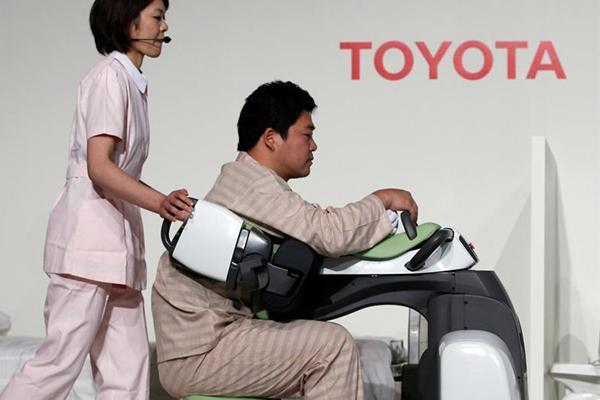Japanese automakers have looked beyond the industry trend to develop self-driving cars and instead are focusing their attentions on developing robots in an effort to keep Japan's elderly population on the move. The country's population is ageing faster than the rest of the world and its birthrate continues to decrease. Toyota Motor Corp has recognized the potential in becoming a mass producer of robots in order to alleviate and help Japan's elderly citizens.
The country's unique and shifting demographics have placed its automakers in a unique situation - traditional issues facing countries with falling populations are labor shortages and pension squeezes. However, Japan is also facing dwindling domestic demand for cars. Toyota, which is the world's second largest automaker made its foray in commercializing rehabilitation robots - its 'walk -assist' service will enable patients that have had a stroke or suffer from other conditions that have affected their mobility to learn how to walk again.
Chief Officer of Toyota's Frontier Research Center, Toshiyuki Isobe suggested that if there's a way the organization can help people remain mobile after they can no longer drive then they have to look past cars and become a manufacturer of robots. He said: "If there's a way that we can enable more elderly people to stay mobile after they can no longer drive, we have to look beyond just cars and evolve into a maker of robots. Be it robots or cars, if there's a need for mass produced robots, we should do it with gusto.”
Toyota has been faced with the issue quicker than other automakers in different parts of the world as the Japanese population is greying faster than anyone else. The number of people aged 65 or older accounted for 26.7% of the population in 2015. Subsequently the demand for care services required to look after the elderly has boomed and that has put an inevitable strain on a significantly reduced working population which ultimately means that fewer able-bodied adults can look after them.
Analysts have predicted that sales of robots specifically designed to help with elderly and handicap assistance will total about 37,500 units in 2016-2019 and are expected to increase substantially within the next 20 years. In addition to this, car sales in Japan have plummeted by 8.5% from 2013-2016.
Isobe conceded that it took Toyota longer to develop robots than cars, as it stretched the company further beyond its comfort zone. As a result, Toyota's new walking assist system took more than 10 years to bring to market.
"The biggest challenges have been in determining the needs of the robot market, which is relatively new, and to ensure that our products are safe," Isobe said.
Still, industry experts said that automakers were well placed to compete with medical technology companies including Switzerland's Hocoma and robot manufacturers such as ReWalk Robotics of the United States, both of which have developed robotic walking assist systems.

